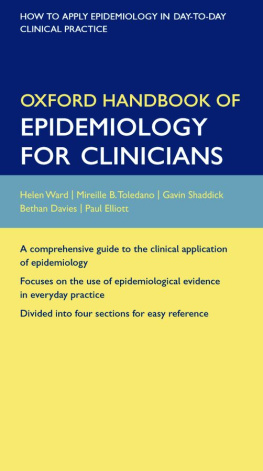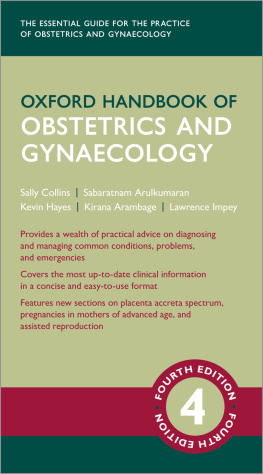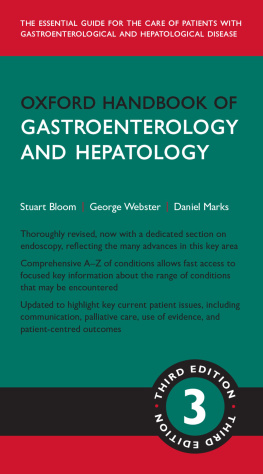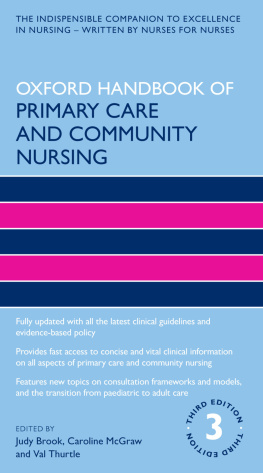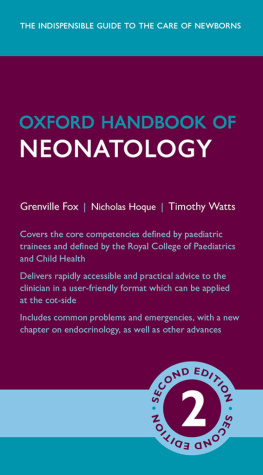Ward Helen - Oxford Handbook of Epidemiology for Clinicians
Here you can read online Ward Helen - Oxford Handbook of Epidemiology for Clinicians full text of the book (entire story) in english for free. Download pdf and epub, get meaning, cover and reviews about this ebook. year: 2014, publisher: Oxford Univ Pr, genre: Home and family. Description of the work, (preface) as well as reviews are available. Best literature library LitArk.com created for fans of good reading and offers a wide selection of genres:
Romance novel
Science fiction
Adventure
Detective
Science
History
Home and family
Prose
Art
Politics
Computer
Non-fiction
Religion
Business
Children
Humor
Choose a favorite category and find really read worthwhile books. Enjoy immersion in the world of imagination, feel the emotions of the characters or learn something new for yourself, make an fascinating discovery.
- Book:Oxford Handbook of Epidemiology for Clinicians
- Author:
- Publisher:Oxford Univ Pr
- Genre:
- Year:2014
- Rating:4 / 5
- Favourites:Add to favourites
- Your mark:
- 80
- 1
- 2
- 3
- 4
- 5
Oxford Handbook of Epidemiology for Clinicians: summary, description and annotation
We offer to read an annotation, description, summary or preface (depends on what the author of the book "Oxford Handbook of Epidemiology for Clinicians" wrote himself). If you haven't found the necessary information about the book — write in the comments, we will try to find it.
Ward Helen: author's other books
Who wrote Oxford Handbook of Epidemiology for Clinicians? Find out the surname, the name of the author of the book and a list of all author's works by series.
Oxford Handbook of Epidemiology for Clinicians — read online for free the complete book (whole text) full work
Below is the text of the book, divided by pages. System saving the place of the last page read, allows you to conveniently read the book "Oxford Handbook of Epidemiology for Clinicians" online for free, without having to search again every time where you left off. Put a bookmark, and you can go to the page where you finished reading at any time.
Font size:
Interval:
Bookmark:

Oxford Handbook of
Epidemiology
for Clinicians
Published and forthcoming Oxford Handbooks
Oxford Handbook for the Foundation Programme 3e
Oxford Handbook of Acute Medicine 3e
Oxford Handbook of Anaesthesia 3e
Oxford Handbook of Applied Dental Sciences
Oxford Handbook of Cardiology 2e
Oxford Handbook of Clinical and Laboratory Investigation 3e
Oxford Handbook of Clinical Dentistry 5e
Oxford Handbook of Clinical Diagnosis 2e
Oxford Handbook of Clinical Examination and Practical Skills
Oxford Handbook of Clinical Haematology 3e
Oxford Handbook of Clinical Immunology and Allergy 2e
Oxford Handbook of Clinical Medicine - Mini Edition 8e
Oxford Handbook of Clinical Medicine 8e
Oxford Handbook of Clinical Pathology
Oxford Handbook of Clinical Pharmacy 2e
Oxford Handbook of Clinical Rehabilitation 2e
Oxford Handbook of Clinical Specialties 8e
Oxford Handbook of Clinical Surgery 3e
Oxford Handbook of Complementary Medicine
Oxford Handbook of Critical Care 3e
Oxford Handbook of Dental Patient Care 2e
Oxford Handbook of Dialysis 3e
Oxford Handbook of Emergency Medicine 4e
Oxford Handbook of Endocrinology and Diabetes 2e
Oxford Handbook of ENT and Head and Neck Surgery
Oxford Handbook of Epidemiology for Clinicians
Oxford Handbook of Expedition and Wilderness Medicine
Oxford Handbook of Gastroenterology & Hepatology 2e
Oxford Handbook of General Practice 3e
Oxford Handbook of Genitourinary Medicine, HIV and AIDS 2e
Oxford Handbook of Geriatric Medicine 2e
Oxford Handbook of Infectious Diseases and Microbiology
Oxford Handbook of Key Clinical Evidence
Oxford Handbook of Medical Dermatology
Oxford Handbook of Medical Imaging
Oxford Handbook of Medical Sciences
Oxford Handbook of Neonatology
Oxford Handbook of Nephrology and Hypertension
Oxford Handbook of Neurology
Oxford Handbook of Nutrition and Dietetics 2e
Oxford Handbook of Obstetrics and Gynaecology 2e
Oxford Handbook of Occupational Health
Oxford Handbook of Oncology 3e
Oxford Handbook of Ophthalmology 2e
Oxford Handbook of Oral and Maxillofacial Surgery
Oxford Handbook of Paediatrics
Oxford Handbook of Pain Management
Oxford Handbook of Palliative Care 2e
Oxford Handbook of Practical Drug Therapy 2e
Oxford Handbook of Pre-Hospital Care
Oxford Handbook of Psychiatry 2e
Oxford Handbook of Public Health Practice 2e
Oxford Handbook of Reproductive Medicine & Family Planning
Oxford Handbook of Respiratory Medicine 2e
Oxford Handbook of Rheumatology 3e
Oxford Handbook of Sport and Exercise Medicine
Oxford Handbook of Tropical Medicine 3e
Oxford Handbook of Urology 2e

Great Clarendon Street, Oxford ox2 6dp
United Kingdom
Oxford University Press is a department of the University of Oxford.
It furthers the Universitys objective of excellence in research, scholarship, and education by publishing worldwide. Oxford is a registered trade mark of Oxford University Press in the UK and in certain other countries
Oxford University Press, 2012
The moral rights of the authors have been asserted
First edition published 2012
Impression: 1
All rights reserved. No part of this publication may be reproduced, stored in a retrieval system, or transmitted, in any form or by any means, without the prior permission in writing of Oxford University Press, or as expressly permitted by law, by licence or under terms agreed with the appropriate reprographics rights organization. Enquiries concerning reproduction outside the scope of the above should be sent to the Rights Department, Oxford University Press, at the address above
You must not circulate this work in any other form
and you must impose this same condition on any acquirer
British Library Cataloguing in Publication Data
Data available
Library of Congress Cataloging in Publication Data
Data available
ISBN 9780198529880
ebook ISBN 9780191654787
Printed in China
Oxford University Press makes no representation, express or implied, that the drug dosages in this book are correct. Readers must therefore always check the product information and clinical procedures with the most up-to-date published product information and data sheets provided by the manufacturers and the most recent codes of conduct and safety regulations. The authors and the publishers do not accept responsibility or legal liability for any errors in the text or for the misuse or misapplication of material in this work. Except where otherwise stated, drug dosages and recommendations are for the non-pregnant adult who is not breast-feeding.
Links to third party websites are provided by Oxford in good faith and for information only. Oxford disclaims any responsibility for the materials contained in any third party website referenced in this work.
Now more than ever clinicians need to understand evidence. Healthcare is evolving rapidly with innovation leading to ever more effective and efficient diagnostic tools, treatments, service delivery, and preventive interventions. Being able to interpret clinical trials, meta-analyses, systematic reviews, and the results of individual investigations and apply these to the patient sitting in front of us is a greater challenge than ever given the volume of evidence being generated. Much of the evidence needed in the consulting room, as in the hospital boardroom, comes from studies of populations, and understanding these kinds of data requires good epidemiological skills and insights.
This handbook is an invaluable means for grasping the principles of epidemiology as applied to everyday clinical practice. It introduces concepts such as distribution, measurement, and risk in relation to diagnosis and management, making them very relevant for medical students and junior doctors. There is a series of helpful worked examples from diagnostics through management and discussion of prognosis which link to the later sections on study design and statistics. Doctors in training will find the very practical sections on finding and summarizing evidence through systematic review and meta-analysis, plus the step-by-step guide to clinical audit, particularly useful. The book also has a valuable reference section that medical students and others studying for professional exams will appreciate giving a structured guide to the epidemiology of some of the most common diseases.
Working with patients and communities to improve health and prevent illness is now all our business. This handbook provides an overview of the relevant evidence with reminders of how to assess risk, deliver brief interventions, and communicate risk to patients.
Many clinicians reading this book will find it opens their eyes to the widespread application of epidemiology and prevention and will embrace it in their pursuit of excellence and evidence-based practice.
Professor the Lord Darzi of Denham PC, KBE
What is a cohort study? How do I critique a scientific paper? What is the incidence of heart disease? How do I calculate relative risk? How do I plan and carry out my own study? What differentiates association from causality? These are the sorts of questions that training in epidemiology will answer but the answers may not be so readily accessible to the busy clinician or medical student. This books aims to fill that gapto provide the basics in epidemiology for clinicians in one handy volume, following the successful Oxford Handbook format.
Font size:
Interval:
Bookmark:
Similar books «Oxford Handbook of Epidemiology for Clinicians»
Look at similar books to Oxford Handbook of Epidemiology for Clinicians. We have selected literature similar in name and meaning in the hope of providing readers with more options to find new, interesting, not yet read works.
Discussion, reviews of the book Oxford Handbook of Epidemiology for Clinicians and just readers' own opinions. Leave your comments, write what you think about the work, its meaning or the main characters. Specify what exactly you liked and what you didn't like, and why you think so.

